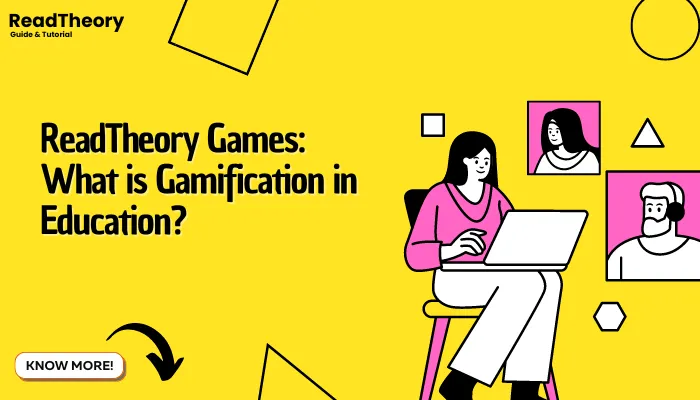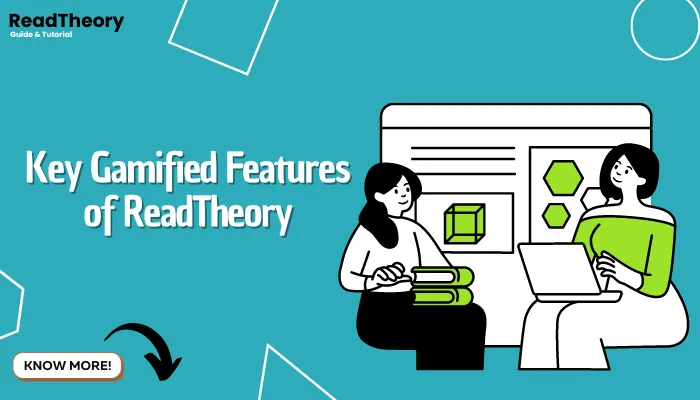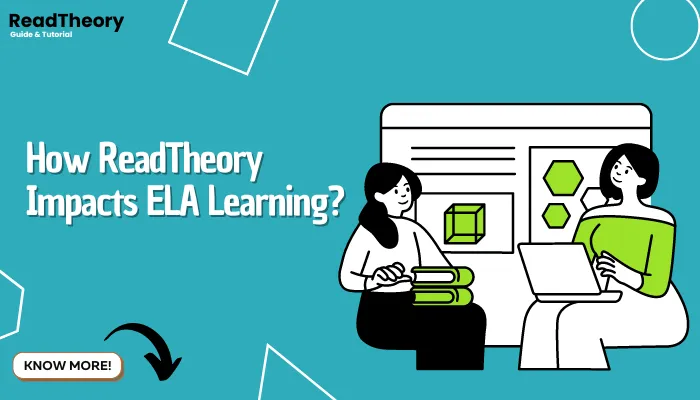ReadTheory games have reimagined ELA learning by turning traditional lessons into an engaging, interactive experience. With features like Knowledge Points, Progress Badges, and quizzes, ReadTheory makes learning enjoyable and boosts both motivation and comprehension.

Discover how these game-like elements transform reading education into a dynamic and rewarding journey.

ReadTheory Games:What is Gamification in Education?
ReadTheory Games have transcended traditional boundaries, becoming a transformative tool in education by incorporating game-like elements to enhance learning experiences.
Definition and Overview
- Concept of Gamification: There is a prevalence of the term gamification in various fields that are not necessarily viewed as games, such as business or education. Gaming elements including points, badges, leaderboards and so on can be applied to basic operations of different types of educational facilities to improve the principles of education.
- Objectives of Gamification: Any gamification attempt targets at improving students engagement, motivation, or participation. The use of these devices in learning endeavours is intended to simplify and spice up the otherwise boring and tedious learning tasks.
Benefits of Gamification in Learning
- Increased Engagement and Motivation: Gamification introduces competition, rewarding and progression that makes students interested. These characteristics promote the interest of learners towards the given practices and mobilises them actively.
- Improved Retention and Understanding of Material: By making the content interactive and utilizing games, retention can easily be improved since the information is more captivating. Gamification allows one to get bored from time to time but usually comes with repeated activities with learned materials that serve to boost comprehension and understanding of the subjects.
By leveraging ReadTheory games and gamification, educators can transform conventional learning into an engaging and effective process, making educational tasks more enjoyable and impactful for students.

Key Gamified Features of ReadTheory
ReadTheory Games‘ gamified features, including Knowledge Points, Progress Badges, and interactive quizzes, transform traditional learning into a dynamic and motivating experience.
Knowledge Points
Knowledge Points as used in ReadTheory is a kind of a virtual currency. Students earn points for selecting correct answers to quizzes, reading different passages, among other’s activities on the platform. Those points act as a practical unit of measure of growth and achievement.
With more Knowledge Points accrued, students tend to be motivated and would appreciate that ‘I am getting better within this time period. This feature of gamification serves as positive feedback that encourages learners to keep on studying and wish to top the next time round.
Progress Badges
There is a system of Progress Badges in ReadTheory which gets awarded to the students for certain levels attained or targets met. These badges represent different levels of accomplishment and can be displayed on a student’s profile.
Some of the Progressive Badges include the following;
- Reading Streak Badges: Rewarded for reading a specified number of passages without any break.
- Quiz Mastery Badges: This badge is awarded for obtaining a certain score on a quiz or a certain type of a quiz.
- Level Up Badges: Regarding the ReadTheory platform, these are given for reaching the next level of the game.
The badges in ReadTheory games give feedback to students regarding their accomplishments, motivating them to seek new targets and push themselves further. They also encourage students to set additional goals and keep striving for greater achievements.
Interactive Games and Certainly Quizzes
The component in the ReadTheory which most learners enjoy is interactive quizzes. These are standard questions set with the aim of evaluating the extent to which the students have comprehended the given reading passages and vague tries to utilize the critical thinking ability. These usually consist of multiple-choice, short-answer questions and other interactive features.
Challenges in this context are extra work or things that the learners can do that will allow them to learn more. These challenges can be in the form of essay writing, vocabulary exercises, cooperative work, and such.
Both quizzes and challenges help strengthen the ELA concepts learned and the various skills acquired by the students. They assist in strengthening comprehension, clarifying aspects that need more focus, and also engaging with the material in a more hands-on manner.
By integrating engaging elements through ReadTheory games, the platform not only makes learning more enjoyable but also enhances students’ skills and progress in English Language Arts.

How ReadTheory Impacts ELA Learning?
ReadTheory Games significantly transform ELA learning by fostering enhanced engagement, personalized experiences, and effective progress tracking.
Enhanced Engagement
Students are highly motivated to take part in ELA learning activities due to the use of gamification, which revolutionizes reading comprehension. ReadTheory surrounds students with an enjoyable atmosphere through the use of skill games, which not only enhances readiness for learning but also assists in developing enthusiasm for the subject.
- Increased Participation: Gamification leads to an improvement in the level of student – s involvement in various learning processes. Engagement in the activities is driven by a wish to earn a certain amount of points to collect, earn badges and even become a leader on the table.
- Improved Enthusiasm: The element of competition that makes education more engaging in this era of the gaming could instill enthusiasm among students. Competing against friends, and earning high scores can perform fighting to achieve in academics.
Personalized Learning Experience
ReadTheory Games appeal to different learning approaches and offer a customized learning experience through their gamified features.
- Adaptive Assessments: The quizzes presented to the students on the platforms are progressive in the sense that they take into account the level of the students such that they do not become too difficult or too easy for them. This customization makes it easy for the students to concentrate and feel challenged.
- Targeted Practice: Gamification helps the learners to concentrate in areas where more input is required. With the help of ReadTheory, certain exercises will be given depending on students’ performance and improvement shown within those given activities.
Tracking Progress and Achievement
ReadTheory games use Knowledge Points and Progress Badges as key tools for measuring student progress and achievement.
- Clear Indicators of Progress: Students can work toward obtaining Knowledge Points which are visible measures of the level of activity of a student. Students may want to progress further and develop fresh objectives once they already have some points.
- Visual Recognition of Accomplishments: At the same time, Progress Badges are aimed at acknowledging students’ achievements visually. Such badges can act as a sort of incentive aid and help students keep on learning and trying to be as good as possible.
- Goal Setting and Tracking: With tracking of progress and achievements, all learners can set appropriate learning targets and gauge the extent of progress made towards those targets. This helps the learners to energize and stress concentrate on their studies.
By harnessing the power of gamification, ReadTheory not only motivates students but also provides a tailored approach to mastering ELA, ultimately leading to more meaningful and measurable educational outcomes.
Success Stories and Testimonials
Real-world examples and firsthand accounts highlight how ReadTheory Games have transformed ELA learning experiences for both students and educators.
Case Studies
- Example 1: Urban School District: In New York City, the ReadTheory program was adapted into the ELA Lesson plans at Washington Heights Elementary School.
- Example 2: Elementary School: ReadTheory was an additional material for reading instruction at Lincoln Elementary School in Chicago.
Student Testimonials
“ReadTheory is amazing! I can’t wait for my turn because it feels like battling after school, only this time I’m making progress in cough reading as well. I feel that I have improved in comprehension.”
– Sarah Johnson
“I always hated reading; currently, it is difficult to come by a book to read. I enjoy Readtheory and that makes reading more appealing. I’m happy with the progress I have.”
– David Lee
“What I appreciated about ReadTheory is that it gives me progressive feedback about what I did wrong and how I can correct that. It is good for developing reading skills.”
– Maria Rodriguez
These case studies and testimonies are intended to showcase the ReadTheory solutions effectiveness in the ELA learning context. Through gamification, the e-learning platform is able to arouse learners’ intrinsic motivation and engagement and enhance their reading comprehension abilities.
How to Start with ReadTheory Games?
Getting started with ReadTheory Games is a straightforward process that opens the door to a wealth of engaging and educational resources for both students and educators.
Creating an Account
For the purpose of exploring ReadTheory further, the following steps should be taken in order to create an account:
- ReadTheory login page: Visit the website: ReadTheory/auth/login
- Click on Sign Up: You should then click on the Sign up button and fill in the rest in terms of your name, email and password.
- User Types: Pick whether you are a student, teacher or a parent.
- Take a tour: After you have successfully created your account, you are free to take a tour of the ReadTheory platform and its game like functionalities.
Navigating the Platform
In order to maximize their use of ReadTheory, here are some recommendations:
- Make sure to sorts through their features: Get acquainted with the several elements available on this platform such as rims for reading passages, quizzes, leader boards, and badges.
- Decide on self-set objectives to achieve: set personal learning objectives so as to assist yourself in staying motivated and keeping track of your achievements.
- Take advantage of learning tools provided: Make use of the extra materials available on ReadTheory, including vocabulary words and grammar notes.
- Be encouraged: Of course you have to accept that it is not only about the informatic aspects but as well about the fun engaging one.
Guidelines for Teachers
For teachers who wish to incorporate ReadTheory games into their ELA units, here are some useful recommendations:
- Make connections with learning goals: It is advisable to make certain that the activities within ReadTheory complement the aims or objectives of your course.
- Use differentiated practices: ReadTheory can be employed to address various learners and their skills and modes of learning.
- Fosters competition and teamwork: It is important to encourage competition among students, for instance by using leader boards and team games.
- Assess performance: Utilize ReadTheory’s monitoring capabilities in assessing student progress and give the necessary help or support.
- Create a growth mindset classroom: Build a classroom climate where achievement is valued, students are made to feel safe to fail and learn from their failures.
By effectively navigating ReadTheory and leveraging its gamified features, users can maximize their learning experience and achieve their educational goals while making the process enjoyable and rewarding.
Conclusion
ReadTheory games have revolutionized the way students engage with ELA, turning traditional learning into a dynamic and interactive experience. By integrating gamified features like Knowledge Points, Progress Badges, and interactive quizzes, ReadTheory not only enhances student motivation and participation but also improves comprehension and retention.
These elements foster a more personalized and effective learning environment, making the journey through English Language Arts both enjoyable and rewarding.
